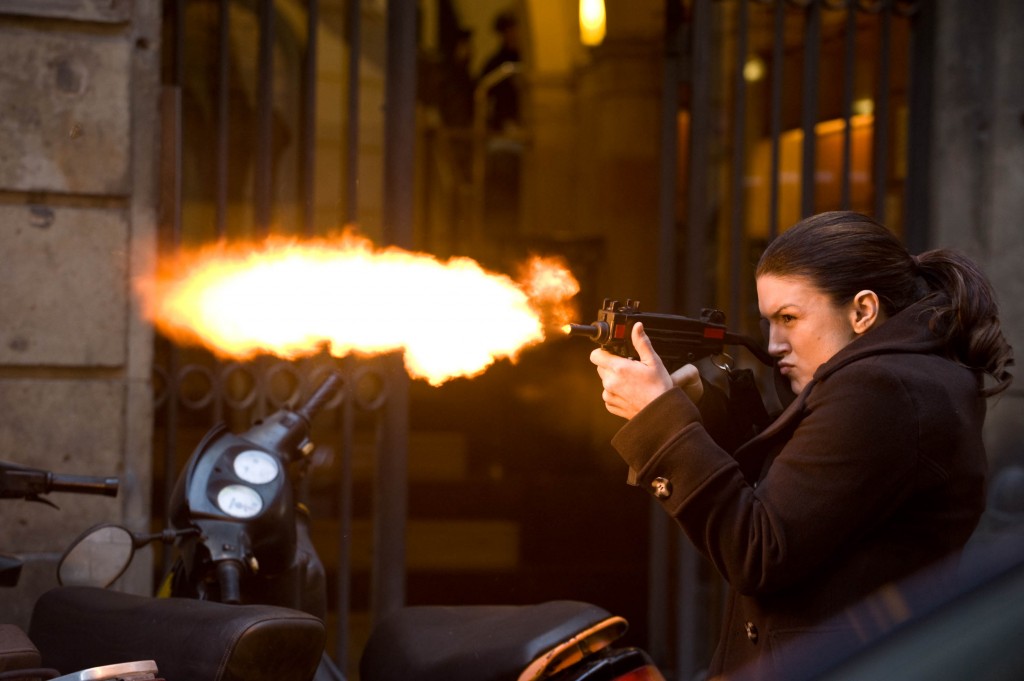Haywire Review
 Into a quiet diner walks Mallory Kane (Gina Carano). Following shortly behind her is Aaron (Channing Tatum). Mallory is quick to see him arrive and we get the impression instantly that Mallory is a hyper alert character, Carano conveying this through small physical inflections. Aaron and Mallory clearly have history and as the two begin to talk it is clear that Aaron wants her to leave with him but Mallory’s not interested. The situation quickly escalates beyond this almost light hearted argument into the two having a full blown physical fight.
Into a quiet diner walks Mallory Kane (Gina Carano). Following shortly behind her is Aaron (Channing Tatum). Mallory is quick to see him arrive and we get the impression instantly that Mallory is a hyper alert character, Carano conveying this through small physical inflections. Aaron and Mallory clearly have history and as the two begin to talk it is clear that Aaron wants her to leave with him but Mallory’s not interested. The situation quickly escalates beyond this almost light hearted argument into the two having a full blown physical fight.
The fight is brutal, faces are pounded and bones crunch, but it’s also beautifully choreographed, expertly performed and shot and edited with the utmost skill and scalpel-like precision. Using a number of different set-ups Soderbergh, editing the film under one of his usual aliases, cuts between them with enough speed to ensure the sequence is dynamic but slow enough to ensure one’s eyes take in all the necessary information.
The scene is something of a masterclass in the way in which action can be shot and edited, and it doesn’t hurt that Carano, the star of the scene and the film, is an accomplished MMA fighter.
Mallory is a covert operative employed by an agency whose client book includes the US government. The agency frequently carry out jobs that the government would rather not get their hands dirty doing themselves and Mallory quickly comes to the government’s attention. Prior to their confrontation in the diner Aaron and Mallory worked together on a hostage rescue in Barcelona, work that their handler Kenneth (Ewan McGregor) won from US government employer Coblenz (Michael Douglas). Since the mission a lot has changed though, Mallory has ‘gone rogue’ and her former employers are hot on her heels. Following her escape from Aaron, Mallory steals a car, taking its owner Scott (Michael Angarano) hostage. She then begins to tell Scott all the details that led her to where she is now and the film shifts into a series of flashbacks that make up the bulk of the film.
The script, penned by Lem Dobbs (The Limey), is economical enough to ensure that the film, which is at its heart a fast-paced action thriller, never gets bogged down in overly complex plotting but it’s also intricate enough to keep one interested and invested in what is transpiring. Various puzzle pieces slowly fall into place and as the full picture is revealed there are twists and turns but no huge surprises. As we gradually learn what has occurred though we are slowly pulled closer and closer to Mallory’s character, investing more in her plight as we do so.
Carano’s performance as Mallory, her first major role, is highly commendable and whilst she brings all that is needed to the stunning action sequences it is in some of the more subtle moments that she really impresses. A cracked smile or quizzical eyebrow at the right moment is enough to communicate everything we need to know and feel and the film is filled with silent communicative moments that work extraordinarily well both on a character and story level.
Carano is also surrounded by a number of excellent actors in supporting roles, including, in addition to those already mention; Bill Paxton, Antonio Banderas, Mathieu Kassovitz and the ever reliable Michael Fassbender.
The fight in a hotel room between Carano and Fassbender, which has been at the centre of the film’s marketing, is truly extraordinary and a high point amidst a number of excellent physical sequences. Their relationship, two spies thrown together and made to play at being a couple, makes for some interesting and playful interplay between the two but there is more going on beneath the surface. Haywire is filled with subtle genre twists, evidence that Dobbs and Soderbergh are having fun subverting expectations somewhat, and the way in which the film’s script deals with the gender of the lead character is also more densely interesting than it may first appear.
When Kenneth (McGregor) comments “Don’t think of her as a woman, that would be a mistake.” the dialogue is making explicit an area for discussion that runs throughout Haywire. Carano is, for instance, as forceful beating Aaron to the ground as she is when she pulls him towards her and kisses him in a flashback to Barcelona. She’s in charge and dominant.
Mallory is not a simple ass-kicking alpha female though, a common archetype that is so often just a male stereotype in the skin of a female action hero, and there are crucial moments when her fragility and emotional range is evident. She is hurt at times, both emotionally and physically, revealing a more complex and truer depth to her character. Haywire is not a heavy-handed essay piece though, it’s a super slick action movie which is just thankfully as intelligently thought out as it is entertaining.
Smart, stylish and incredibly well crafted, Haywire is as ludicrously pleasing to the eye as the best of Soderbergh’s recent work and even if you don’t engage with the intriguing thematic subtext the film is a thrilling and riveting action spectacle with plenty of jaw-dropping action set pieces.